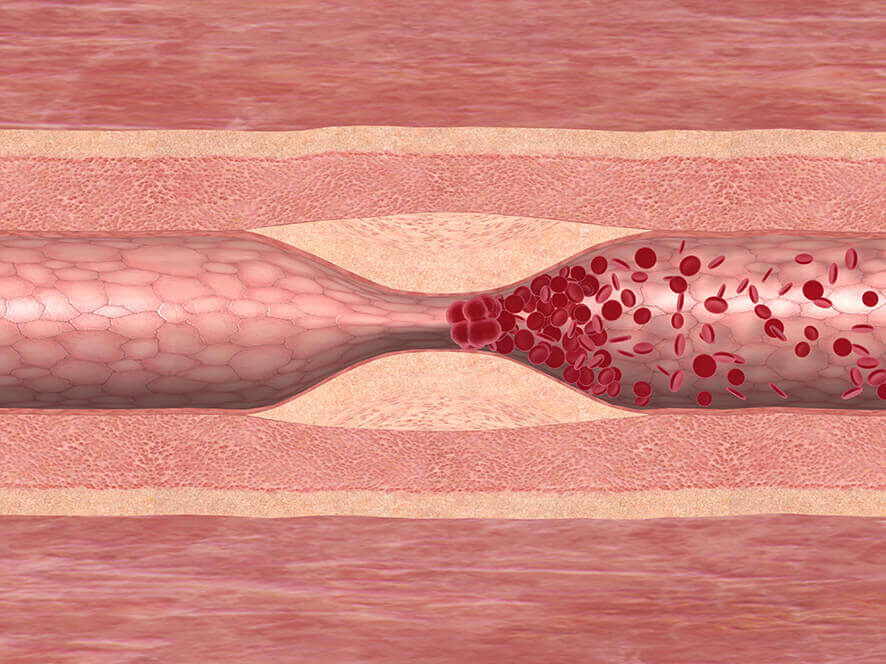Arteriosclerosis and periodontitis - when the mouth makes you ill
In common parlance, the veins "calcify". In medicine, this is known as arteriosclerosis,a chronic inflammation of the arteries. If the arteries that supply tissues, muscles and organs with blood are affected in the long term, the entire blood supply to the body can become unbalanced.
The vascular changes are caused by fat and calcium deposits in the arteries, so-called plaques. They build up on the vessel walls, making them stiffer and thicker and narrowing the inner opening. The blood can no longer flow freely through the arteries. Circulatory disorders set in. In the worst-case scenario, blood can even stagnate. The blood platelets form a clot, a thrombus, which can trigger a heart attack (vascular occlusion). All arteries can be affected. However, arteriosclerosis is most dangerous in the heart and cerebral arteries. It is not without reason that it is considered the main cause of cardiovascular diseases such as heart failure, heart attacks and strokes worldwide.
When calcified vessels knock out
Although peripheral occlusive disease often peaks in old age, it causes serious financial losses for employers. In 1991, a study reported a total of 10,005 cases of incapacity to work among men and 3,465 among women. More serious than the number of absences from work, however, was the length of absence. On average, men were unable to work for 59 days, compared to around 39 days for women.
Arteriosclerosis and its risk messengers
Vascular calcification is not limited to a single risk factor. There are many different triggers. For example, experts urge caution in the case of high blood pressure, diabetes mellitus and elevated blood lipid levels, especially high cholesterol. However, genetic predispositions, advancing age and smoking are also cause for concern. However, the precursors of vascular disease are limited. There are no unpleasant side effects for a long time, so doctors often only discover arteriosclerosis at an advanced stage.
Periodontitis and arteriosclerosis - a dangerous fate
However, diabetes mellitus, nicotine and genetics are not the only risk factors. Experts also suspect a direct link between periodontitis and arteriosclerosis. A US study confirms the suspicion.
Researchers at Columbia University in New York followed 420 periodontitis patients over a period of three years. At regular intervals, they took samples from the chronically inflamed gum pockets of the test subjects and examined them for periodontitis pathogens. At the same time, they examined the patients' carotid arteries using ultrasound in order to best understand changes in the blood vessels and thus the extent of the arteriosclerosis.
The findings were unmistakable: in subjects whose Periodontitis had been successfully treated over the past three years, the carotid artery was significantly less narrowed than in subjects who continued to complain of periodontal symptoms such as bleeding gums, redness and swelling. The narrowing of the vessel wall was up to 0.1 millimetres less in treated study participants. The American researchers thus report a direct link between vascular and gum disease. If the periodontitis improves or worsens only slightly, the changes can already be seen in the narrowing of the vascular wall.
A team of researchers at Orebro University in Sweden is currently investigating the relationship between oral and vascular health. The study focuses on an artificial aorta, the cell wall of which the scientists have infected with the aggressive periodontitis germ Porphyromonas gingivalis. The result: the oral pathogen can damage the smooth surface of the muscle cells and trigger inflammation in the aorta - further proof of the link between oral and vascular health.
The danger from the mouth
If periodontitis is not recognized and treated early, it can lead to more than just tooth loss. The infectious bacteria can spread from the gums into the bloodstream and settle in other parts of the body. It is not uncommon for the arteries to be affected. The oral pathogens cause chronic inflammation, which can lead to secondary symptoms such as vascular calcification and cardiovascular disease.
